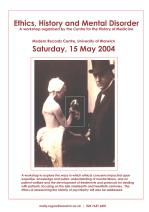Commentary: Ethics, History and Mental Disorder
Commentary
In his opening address to this colloquium concerning the history of mental disorders, Professor Bill Fulford suggested that ethical reflection is the hallmark of a mature discipline of psychiatry. This is true of any mature discipline, including history, for no scholarship occurs in the absence of moral values. While some historians claim that their role is to describe the past rather to engage in formal ethical analysis of it, even in description, normative decisions are made about how to represent past events. Values are embedded in scholarship; therefore, it is incumbent upon researchers to make explicit what values are at play in their work. How and when to make values explicit is one component of the larger problem of determining what constitutes ethical historical practice. Other areas of historical practice which deserve ethical scrutiny include questions of how research topics are identified and funded, what criteria are used to determine whether past practices are ethical or unethical, how the past is represented, and what kinds of discourses emerge from these representations.
In order to determine what constitutes ethical historical practice, we need a method of determining whether something is ethical or not. To that end, two overarching views of ethics are commonly put forward as candidates. The first is embraced by those who have hope for a universal ethical system that can be applied in all, or at least most, circumstances. On this view, rules, policies, laws and the like will provide us with action guides to enable us to determine what we ought to do in given situations. This model also allows for surveillance. By applying rules to specific actions or behaviours, we can determine who and what is in violation of them. The second approach to ethics implicitly rejects the universalist stance and seeks to place equal weight upon competing viewpoints about what is right. According to this view, the best way to determine what is right for an ethical problem, is to ensure a fair process in which diverse set of viewpoints are represented when making the decision. This view lends itself to a consensus model of ethics; rightness is located in what we can all agree to, or at least about that which we can compromise.
Both models of ethics can be useful in helping us resolve the ethical questions identified above. Policies can outline our obligations towards human participants in research, laws concerning closure periods indicate from which year it is considered ethical to begin research. Alternatively, a consensus model can be useful in examining issues in which various viewpoints have been traditionally neglected such as the priority that should be placed upon researching the activities of women or minority groups. However, both viewpoints also have limitations. Rules can never provide sufficient detail to incorporate the nuances of any and all situations. Furthermore, rules focus our attention on what we must not do to avoid sanction rather than in valuing ethical rightness in and of itself. Meanwhile, consensus cannot be the only criterion for rightness because it is possible for a group of people to agree to something that would otherwise be considered wrong such as slavery, gender discrimination etc.
While both the rules and consensus orientations can assist in determining what constitutes ethical historical practice, another line of enquiry that is likely to be fruitful focuses not on what kinds of actions historians ought to take, but on what kinds of people historians ought to be. This emphasis on virtue ethics is enjoying renewed interest in health care ethics and beyond. Determining what is virtuous is difficult. Such a discussion must consider what qualities are virtuous and why and how to cultivate them. Other problems in adopting a virtues approach to ethics include how virtues are imparted and what to do about someone who does not seem to have absorbed them. Although fraught with interpersonal, philosophical and political challenges, a virtues orientation may provide additional richness to a discussion of the ethical practice of history.

